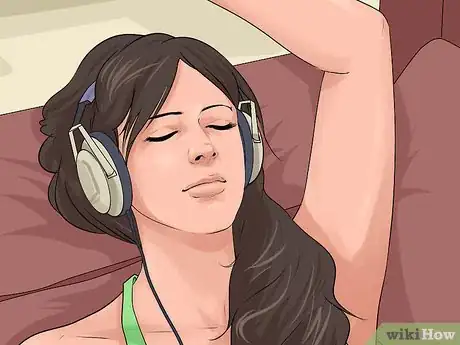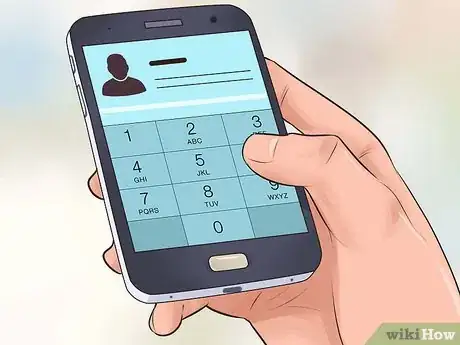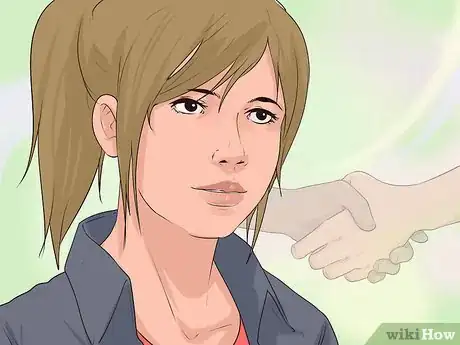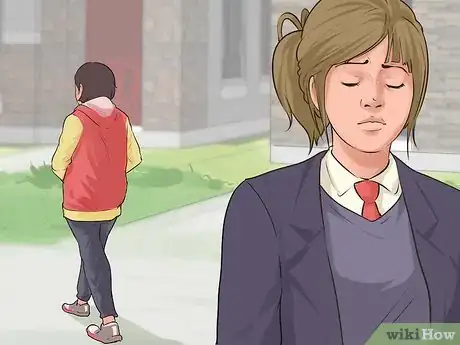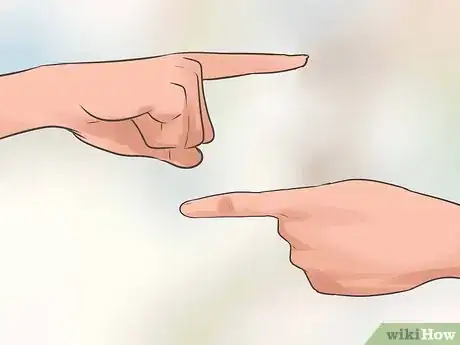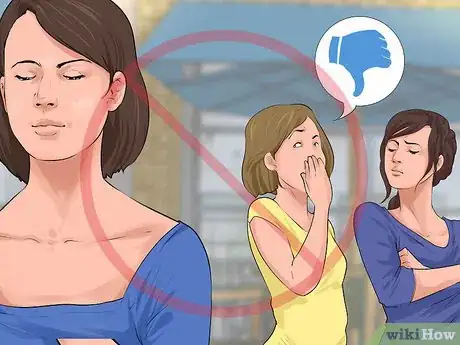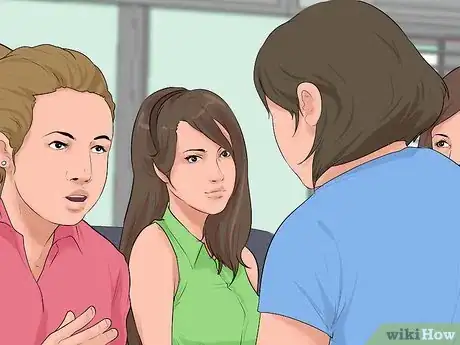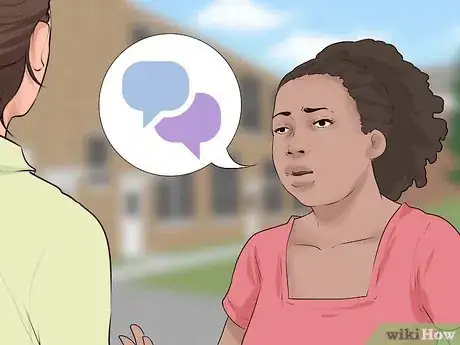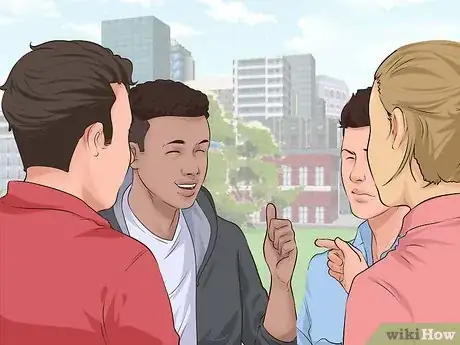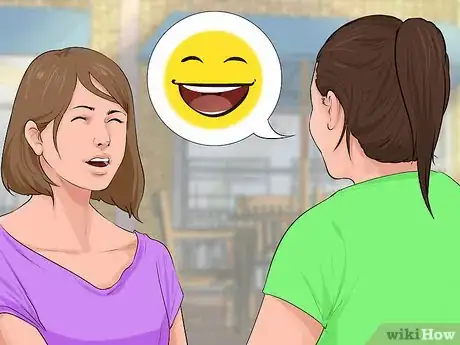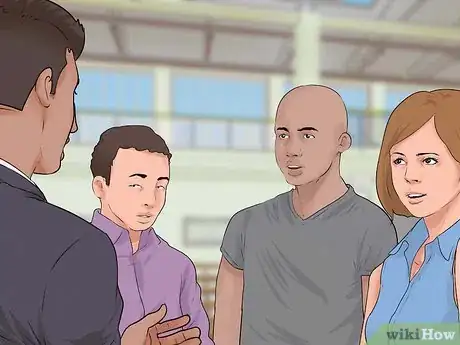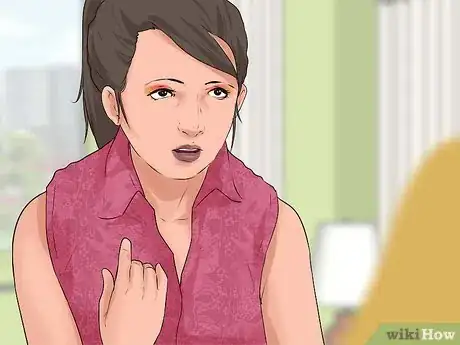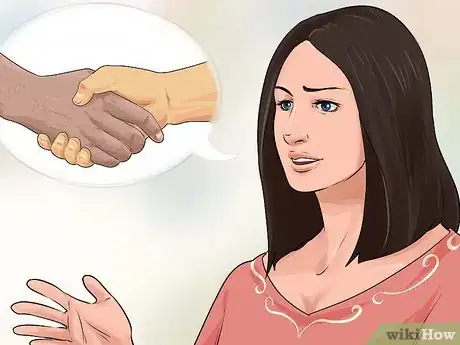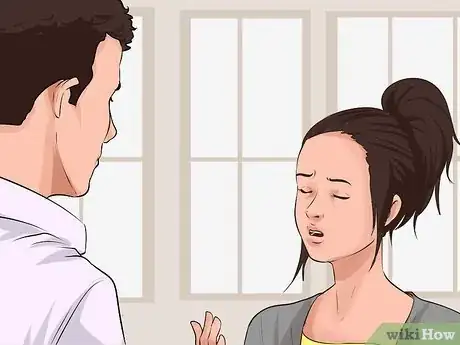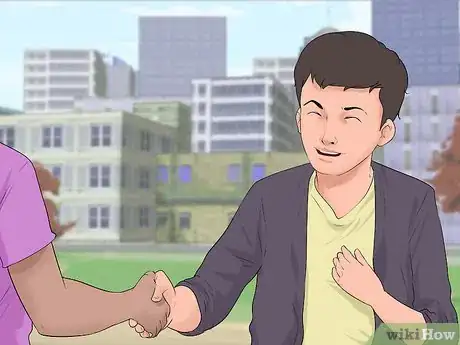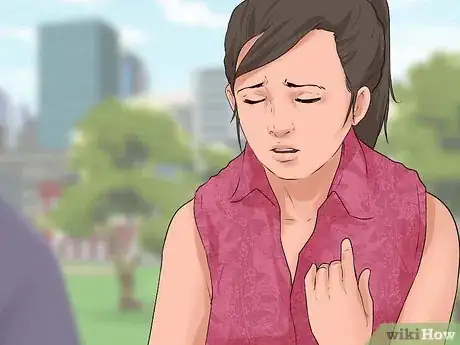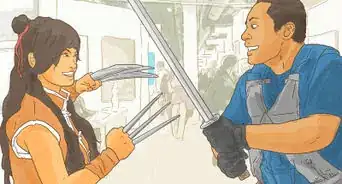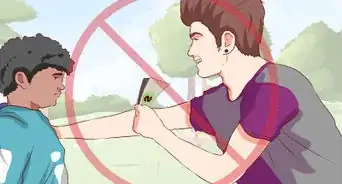This article was co-authored by Jin S. Kim, MA. Jin Kim is a Licensed Marriage and Family Therapist based out of Los Angeles, California. Jin specializes in working with LGBTQ individuals, people of color, and those that may have challenges related to reconciling multiple and intersectional identities. Jin received his Masters in Clinical Psychology from Antioch University Los Angeles, with a specialization in LGBT-Affirming Psychology, in 2015.
There are 8 references cited in this article, which can be found at the bottom of the page.
This article has been viewed 62,828 times.
You and your friend may have had a huge disagreement that has left you angry and hurt, and now you are too upset to even talk to each other. It is hard to be in a place of unresolved conflict with a person you care about, but sometimes it is important to give your friend some distance as both of you get over your anger and hurt feelings. You can also try talking to your friend about the fight, apologize, and find some ways to move forward. While you are coping with the fallout from the fight, make sure you are still behaving respectfully and with maturity in your social circle and around your friend.
Steps
Keeping Your Distance
-
1Give yourselves a cooling-off period. If you had a big blow-up, it is probably best that you take a break from each other for a few days to calm down and reduce your anger levels. This will also give you both a chance to reflect on the situation, your motives, and your emotions. You’ll be able to talk to each other much better when you are both less upset.[1]
- If you hang out in the same circle of friends, continue spending time with them, but only when your friend will not be there. Even if you have calmed down, there will still be some tension between the two of you until the matter is resolved, which may make your other friends uncomfortable.
- Don’t text or communicate through social media. If it is upsetting to you, consider hiding your friend’s posts from your feeds until the two of you have cleared the air.
-
2Try talking after a few days have elapsed. Once you feel calmer, take the initiative to approach your friend and try to talk. Understand that your friend might not be ready to talk yet, and respect that they may need some extra time.
- You could say, “Hey, I was wondering if we could talk about the other day. I was pretty mad but have calmed down now. Are you ready to talk?”
- If your friend says no, say you understand. Give them a few more days and then try again.
Advertisement -
3Be patient. Understand it may take a while for your friend to come around, particularly if the fight was your fault. Each time you check in with your friend, you could start the process of apologizing to them.
- You could say, “Clara, I have been having negative emotions since we had that fight. I felt upset and hurt that you chose to work with Isabella in the maths project. That led me to say you suck at maths. You are allowed to have other friends. It was my fault for being jealous. Next time, I will control my emotions. I'm truly Sorry. I would like to be forgiven and be friends again. However it is your choice and I will accept the outcome."
-
4Accept your friend’s decision if they want to end the friendship. You may talk to your friend directly about their desire to end the friendship, you may find out through another friend that your friend wants to end your relationship, or your friend may just continue to avoid you. You could try to talk to the friend about it, but if they refuse, you may need to let it go.
- Losing a friend can be painful. It’s okay to be sad and grieve the loss of your friendship. Spend time with your other friends, and talk to someone you trust about how you are feeling. You could also take up a new activity with new opportunities to meet people, to help yourself stay busy.
- Remain polite to your friend and say hello to them when you see them. Respect your friend’s need for distance, and don’t try to force your way back into your friend’s life.
- The close nature of your relationship may change, but you may find that in time you can talk to one another again. You may even be able to rekindle your friendship at some point down the road. Friendships grow and change with age and life, just like people do.[2]
Behaving with Maturity
-
1Don’t bring other people into it. Don’t try to pull mutual friends into your disagreement and try to get them to take your side. Be the bigger person.
- If your friends ask you what happened, you could say, “I don’t want to talk about it right now,” or “That’s between Isabella and me.” Don’t unload on mutual friends about your frustrations; you may end up pressuring them to take sides. While it may be tempting to feel like you have allies in your fight with your friend, think about how it would feel if the roles were reversed.[3]
-
2Avoid gossiping. Don’t talk about your friend behind their back. Gossip usually has a way of getting back to its subject matter. You may make your fight even bigger and more painful.[4]
- If someone gossips to you about the friend you are fighting with, you could say, “I don’t want to gossip about her right now. I don’t want to make our fight worse.”
-
3Seek outside support. If you need to vent about the situation, talk to someone who is not in your social circle. Better yet, take it outside your everyday social setting. Find someone who goes to a different school or a friend who lives far away to chat with.
- You could say, “Do you mind listening to me vent about something I’m dealing with at my school right now? I know you don’t know these people, but I could use an outside perspective.”
-
4Be respectful. Even if you’re not getting along, you can still be nice toward your friend. Treat your friend like you would treat someone you don’t know very well: distant, but respectful.
- You may be forced to interact with your friend at some point, whether it is working together on a project or attending the same party. Stick to the business at hand. If you want to talk about your disagreement, find another time to do it. If your friend tries to bring up your fight, you could say something like, “We’re here to celebrate Jesse’s birthday. Let’s talk about this later.”
-
5Avoid trying to make them jealous. While it may feel good to get under your friend’s skin, it’s not a very mature way to respond. Just act normal and do your best to prevent causing more drama.
- Trying to make someone jealous makes you appear insecure. It also makes you place unnecessary importance on what someone else thinks of you.[5]
- Avoid showing off around the friend you are fighting with, like you are having so much more fun without them.
-
6Stay connected to your mutual friends. Don’t let the fight with your friend get in the way of your relationships with other friends. Try to get on with your social life as best you can.
- Hang out with your friends even if the friend you’re fighting with is there. You can think of some ways to avoid the friend you’re fighting with, like standing away from them or striking up a separate conversation with another friend. It can feel awkward, but you don’t have to put your whole social life on hold because one person is upset with you.
- If your friend has turned others against you, you may be feeling isolated. Stand up for yourself without trying to turn others against your friend. You could find a friend you are close with and say, “I know Laura has told you about our fight and now you’re mad at me, too. I didn’t want to talk about it because I didn’t want people to feel like they had to choose sides. But if you want to hear my side of the story, I will tell you.” In this situation, it might be best to start building a new circle of friends.
-
7Expand your social circle. If it’s been difficult to hang out in your normal group of friends because of your fight, you may want to look outside your usual circle for other social opportunities. You might choose to make new friends or grow closer to acquaintances.[6]
- Make plans with friends in other circles, perhaps others you don’t hang out with as much. For example, maybe you’re friends with people on your athletic team, but don’t hang out with them much outside of practice. Try to get together with them off the field.
- Make some new friends by participating in new activities and meeting new people. If your friends have turned against you and are unwilling to hear your side of the story, you might want to start hanging out with other people instead.[7]
-
8Reflect on your behavior. Spend some time thinking about the fight and your role in it. Could you have done anything differently to prevent the fight from happening? Did you exhibit behavior that routinely causes you problems?
- If you see a pattern of behavior in your life that contributed to the fight with your friend, consider examining that behavior more closely and taking steps to change it. For example, perhaps you contributed to the fight by blurting out some hurtful words before you really thought them through. If you have a history of speaking before thinking, you might want to look into ways you could address that problem and prevent future, similar situations from happening.
- You could spend some time writing in a journal about your thoughts and feelings.
- Talk to another friend or someone you trust about how you are feeling. Maybe that person can offer their own perspective on your situation.[8]
Talking to Your Friend
-
1Schedule a time to talk. Once you and your friend have calmed down and both feel ready to talk about what happened, set aside some time to talk. Find a place and time when you can discuss your issues privately.
- You could say, “Hey, do you have a few minutes after school to talk alone?”
-
2Be prepared for some discomfort. Conversations about a fight are never fun, and can make both people feel upset, uncomfortable, or angry. Do your best to remain calm.
- Speak in a calm, quiet voice. This will help you both stay calm, making you both better able to listen to each other without getting defensive.
- If you find yourself getting angry again, take a few deep breaths. If you feel unable to control your anger, you could say, “I’m sorry, I thought I was ready to talk about this. I guess I need a few more days.”
-
3Say you're sorry. Shoulder your share of the blame and apologize for your role in the fight. Most likely, you are not blameless, and have something you can apologize for. Apologies can be difficult, but don't ignore the fact that you did something that hurt someone you care about, even if it seems small.
- You could say, “I’m really sorry we got into that fight the other day. I realize that I said things that really hurt your feelings. I was angry, but that doesn’t give me the right to be hurtful. I’m so sorry I upset you.”
- When you apologize, make sure you take responsibility for how your behavior hurt your friend. For example, “I’m sorry that I hurt your feelings,” acknowledges responsibility, but “I’m sorry if I hurt your feelings,” makes it sound like you don’t acknowledge that your behavior was wrong.[9]
- Tell your friend how you will change your behavior, so your friend doesn’t need to be concerned you will do it again. For example, “I didn’t realize how making fun of you like that would really hurt your feelings, but now I understand why it did. I promise I won’t joke about that again.”[10]
-
4Be open to hearing your friend’s concerns. Don’t be defensive. When your friend confronts you, listen with an open mind to try to understand where they are coming from.[11]
- If your friend says, “When you told me you wanted to spend more time with Brian, I was really hurt,” you could say, “I get how that could make you upset, and I wish I hadn’t said it.” Do not respond defensively with something like, “Well, when you started dating Mark you ignored me for two months!”
- You could say, “I’m glad you told me your side, so I could understand better. I want to respond to one thing you said, though….” and respond respectfully to your friend’s point of view.
-
5Acknowledge their feelings. Try to see your actions from their perspective and acknowledge their point of view. Show empathy to their perspective. It will help your friend feel listened to and understood.[12]
- You could say something like, “I understand why my behavior made you feel that way. I shouldn’t have ignored you and made you feel unimportant.”
-
6Write a note. If you are having a hard time talking to your friend (whether you are too nervous, or your friend doesn’t want to talk to you), you could write a note apologizing and explaining your feelings. Remember that talking face-to-face is best to avoid further misunderstanding.[13]
- Remember to remain polite and respectful in your letter, just as you would be talking to your friend in person.
- You could write, “I wanted to write you a letter to let you know how sorry I am about what happened. I want to explain my side, but I also understand why you are angry with me.”
Expert Q&A
Did you know you can get expert answers for this article?
Unlock expert answers by supporting wikiHow
-
QuestionHow can you tell if a friendship is toxic?
 Jin S. Kim, MAJin Kim is a Licensed Marriage and Family Therapist based out of Los Angeles, California. Jin specializes in working with LGBTQ individuals, people of color, and those that may have challenges related to reconciling multiple and intersectional identities. Jin received his Masters in Clinical Psychology from Antioch University Los Angeles, with a specialization in LGBT-Affirming Psychology, in 2015.
Jin S. Kim, MAJin Kim is a Licensed Marriage and Family Therapist based out of Los Angeles, California. Jin specializes in working with LGBTQ individuals, people of color, and those that may have challenges related to reconciling multiple and intersectional identities. Jin received his Masters in Clinical Psychology from Antioch University Los Angeles, with a specialization in LGBT-Affirming Psychology, in 2015.
Licensed Marriage & Family Therapist
-
QuestionShould I cut my friend off if I'm mad at her?
 Jin S. Kim, MAJin Kim is a Licensed Marriage and Family Therapist based out of Los Angeles, California. Jin specializes in working with LGBTQ individuals, people of color, and those that may have challenges related to reconciling multiple and intersectional identities. Jin received his Masters in Clinical Psychology from Antioch University Los Angeles, with a specialization in LGBT-Affirming Psychology, in 2015.
Jin S. Kim, MAJin Kim is a Licensed Marriage and Family Therapist based out of Los Angeles, California. Jin specializes in working with LGBTQ individuals, people of color, and those that may have challenges related to reconciling multiple and intersectional identities. Jin received his Masters in Clinical Psychology from Antioch University Los Angeles, with a specialization in LGBT-Affirming Psychology, in 2015.
Licensed Marriage & Family Therapist I'm generally not a fan of "cutting people out," and you really shouldn't do this unless their behavior has been especially dangerous or problematic. If you need to do this to protect yourself, sure, cut them off. But if they haven't done anything especially evil, I'm a big fan of just being honest and communicating with other people. Just tell your friend why you're angry and see if the two of you can work it out.
I'm generally not a fan of "cutting people out," and you really shouldn't do this unless their behavior has been especially dangerous or problematic. If you need to do this to protect yourself, sure, cut them off. But if they haven't done anything especially evil, I'm a big fan of just being honest and communicating with other people. Just tell your friend why you're angry and see if the two of you can work it out.
References
- ↑ http://www.seventeen.com/life/friends-family/a40673/ways-to-deal-when-you-and-your-bestie-arent-friends-anymore/
- ↑ http://www.seventeen.com/life/friends-family/a40673/ways-to-deal-when-you-and-your-bestie-arent-friends-anymore/
- ↑ http://www.seventeen.com/life/friends-family/a40673/ways-to-deal-when-you-and-your-bestie-arent-friends-anymore/
- ↑ http://pbskids.org/itsmylife/friends/rumors/article5.html
- ↑ https://www.psychologytoday.com/blog/insight-is-2020/201409/the-3-reasons-we-can-get-jealous
- ↑ http://www.seventeen.com/life/friends-family/a40673/ways-to-deal-when-you-and-your-bestie-arent-friends-anymore/
- ↑ https://www.empoweringparents.com/article/girl-fighting-and-your-child/#
- ↑ http://www.seventeen.com/life/friends-family/a40673/ways-to-deal-when-you-and-your-bestie-arent-friends-anymore/
- ↑ http://www.slate.com/blogs/lexicon_valley/2014/11/20/sorry_not_sorry_non_apology_fauxpology_unpology_and_other_names_for_hollow.html
- ↑ http://kidshealth.org/en/teens/apologize.html
- ↑ https://www.psychologytoday.com/blog/how-we-work/201304/what-do-when-you-ve-made-someone-angry
- ↑ Jin S. Kim, MA. Licensed Marriage & Family Therapist. Expert Interview. 14 May 2019.
- ↑ http://kidshealth.org/en/teens/apologize.html
